General Health Info, Issues & Natural Remedies
This page covers:
Obesity, Arthritis, Hypertension, High Blood Pressure and Stress, About Diabetes, What is the link between cardiovascular disease and diabetes, Cancer, General Cancer Signs and Symptoms, Skin Lightening Risks and more
Please be aware that in the following text the reference to 'Africans', incorporates those of ethnicity and does not specifically refer to only those born in Africa :-)
Also be aware that I am not a doctor, merely a well-read individual that would like to share the benefits of what I have learnt. Knowledge is power, and I'm not afraid to learn, understand and stand by what I believe are benefits to all. You may not agree with all the information on this page, or any of them perhaps, but its information, for you to grasp, try to understand, and enquire more about. This page is not from a medical doctor or a clinical somebody, but from a woman who cares about people - forget your colour skin, you, whatever colour should treat your mind body and soul like a temple.... and this information will hopefully help.
WE START WITH SOLUTIONS AS LISTED BELOW, and then progress onto the ailments we are currently affected by....
| FOOD | FUNCTION 1 | FUNCTION 3 | FUNCTION 4 | FUNCTION 5 | FUNCTION 6 |
| Apples | Protects your heart | Prevents constipation | Blocks diarrhea | Improves lung capacity | Cushions joints |
| Apricots | Combats cancer | Controls blood pressure | Saves your eyesight | Shields against Alzheimer's | Slows aging process |
| Artichokes | Aids digestion | Lowers cholesterol | Protects your heart | Stabilizes blood sugar | Guards against liver disease |
| Avocados | Battles diabetes | Lowers cholesterol | Helps stops strokes | Controls blood pressure | Smoothes skin |
| Bananas | Protects your heart | Quiets a cough | Strengthens bones | Controls blood pressure | Blocks diarrhea |
| Beans | Prevents constipation | Helps hemorrhoids | Lowers cholesterol | Combats cancer | Stabilizes blood sugar |
| Beets | Controls blood pressure | Combats cancer | Strengthens bones | Protects your heart | Aids weight loss |
| Blueberries | Combats cancer | Protects your heart | Stabilizes blood sugar | Boosts memory | Prevents constipation |
| Broccoli | Strengthens bones | Saves eyesight | Combats cancer | Protects your heart | Controls blood pressure |
| Cabbage | Combats cancer | Prevents constipation | Promotes weight loss | Protects your heart | Helps hemorrhoids |
| Cantaloupe | Saves eyesight | Controls blood pressure | Lowers cholesterol | Combats cancer | Supports immune system |
| Carrots | Saves eyesight | Protects your heart | Prevents constipation | Combats cancer | Promotes weight loss |
| Cauliflower | Protects against Prostate Cancer | Combats Breast Cancer | Strengthens bones | Banishes bruises | Guards against heart disease |
| Cherries | Protects your heart | Combats Cancer | Ends insomnia | Slows aging process | Shields against Alzheimer's |
| Chestnuts | Promotes weight loss | Protects your heart | Lowers cholesterol | Combats Cancer | Controls blood pressure |
| Chili peppers | Aids digestion | Soothes sore throat | Clears sinuses | Combats Cancer | Boosts immune system |
| Figs | Promotes weight loss | Helps stops strokes | Lowers cholesterol | Combats Cancer | Controls blood pressure |
| Fish | Protects your heart | Boosts memory | Protects your heart | Combats Cancer | Supports immune system |
| Flax | Aids digestion | Battles diabetes | Protects your heart | Improves mental health | Boosts immune system |
| Garlic | Lowers cholesterol | Controls blood pressure | Combats cancer | Kills bacteria | Fights fungus |
| Grapefruit | Protects against heart attacks | Promotes Weight loss | Helps stops strokes | Combats Prostate Cancer | Lowers cholesterol |
| Grapes | Saves eyesight | Conquers kidney stones | Combats cancer | Enhances blood flow | Protects your heart |
| Green tea | Combats cancer | Protects your heart | Helps stops strokes | Promotes Weight loss | Kills bacteria |
| Honey | Heals wounds | Aids digestion | Guards against ulcers | Increases energy | Fights allergies |
| Lemons | Combats cancer | Protects your heart | Controls blood pressure | Smoothes skin | Stops scurvy |
| Limes | Combats cancer | Protects your heart | Controls blood pressure | Smoothes skin | Stops scurvy |
| Mangoes | Combats cancer | Boosts memory | Regulates thyroid | Aids digestion | Shields against Alzheimer's |
| Mushrooms | Controls blood pressure | Lowers cholesterol | Kills bacteria | Combats cancer | Strengthens bones |
| Oats | Lowers cholesterol | Combats cancer | Battles diabetes | Prevents constipation | Smoothes skin |
| Olive oil | Protects your heart | Promotes Weight loss | Combats cancer | Battles diabetes | Smoothes skin |
| Onions | Reduce risk of heart attack | Combats cancer | Kills bacteria | Lowers cholesterol | Fights fungus |
| Oranges | Supports immune systems | Combats cancer | Protects your heart | Straightens respiration | |
| Peaches | Prevents constipation | Combats cancer | Helps stops strokes | Aids digestion | Helps hemorrhoids |
| Peanuts | Protects against heart disease | Promotes Weight loss | Combats Prostate Cancer | Lowers cholesterol | Aggravates Diverticulitis |
| Pineapple | Strengthens bones | Relieves colds | Aids digestion | Dissolves warts | Blocks diarrhea |
| Prunes | Slows aging process | Prevents constipation | Boosts memory | Lowers cholesterol | Protects against heart disease |
| Rice | Protects your heart | Battles diabetes | Conquers kidney stones | Combats cancer | Helps stops strokes |
| Strawberries | Combats cancer | Protects your heart | Boosts memory | Calms stress | |
| Sweet potatoes | Saves your eyesight | Lifts mood | Combats cancer | Strengthens bones | |
| Tomatoes | Protects prostate | Combats cancer | Lowers cholesterol | Protects your heart | |
| Walnuts | Lowers cholesterol | Combats cancer | Boosts memory | Lifts mood | Protects against heart disease |
| Water | Promotes Weight loss | Combats cancer | Conquers kidney stones | Smoothes skin | |
| Watermelon | Protects prostate | Promotes Weight loss | Lowers cholesterol | Helps stops strokes | Controls blood pressure |
| Wheat germ | Combats Colon Cancer | Prevents constipation | Lowers cholesterol | Helps stops strokes | Improves digestion |
| Wheat bran | Combats Colon Cancer | Prevents constipation | Lowers cholesterol | Helps stops strokes | Improves digestion |
| Yogurt | Guards against ulcers | Strengthens bones | Lowers cholesterol | Supports immune systems | Aids digestion |
Obesity


THERE IS A LOT OF CONFUSION AND INCORRECT INFORMATION ABOUT WEIGHT LOSS AND OBESITY
The food and drug industries continue to bombard us with false and misleading messages about processed foods and drugs. Using television, radio, newspaper, magazine, and other media, large food and drug organizations are relentless in their pursuit of our dollars. Fast food, cereal, cookies, pizza, beer and wine, other large manufacturers of processed foods send messages 24-7 to get the dollars out of our pockets and to put them in their pockets. They put money before or our health.
IF IT'S a WHITE FOOD PRODUCT DON'T EAT IT!
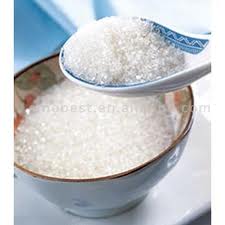
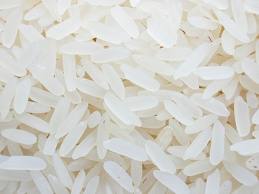
White sugar • White Flour • White Milk • White Rice • White Salt
THESE ARE ALL KILLERS!
Medicare declares obesity to be a disease, stripping away patient responsibility and power
Medicare has now officially declared obesity to be a disease, opening the floodgates for obesity treatments to be covered by federal and private health insurers. To many overweight patients, it's a welcome change, since they were unable to obtain medical treatment for their obesity unless they also suffered medical complications such as diabetes or heart disease.
Over-the-Counter and Herbal Remedies for Weight Loss
Most over-the-counter medicine for weight-loss consists of appetite suppressants. They work by "tricking" the body into thinking that it is not hungry. This can be effective; however, long-term use can lead to addiction and may cause health problems. In addition, weight loss only occurs while you are taking the medicine, unless other behavioral changes such as improved diet and increased exercise are made.
Common Sense Advice for Taking Herbal Medicines
If you become ill while taking an herbal remedy, see a doctor or consult with a health care professional.
Do not take herbs if pregnant or attempting to become pregnant.
Do not take herbs if you are nursing.
Do not give herbs to a baby.
Do not take large quantities of any one herbal preparation.
Do not take any herb on a daily basis.
Buy only preparations in which the plants are listed on the packet (Note: There is no guarantee attached to any product.)
Do not take herbal remedies if you are taking medicine for a chronic condition (for example, high blood pressure or depression). If you are unsure consult with your doctor prior to taking any herbal preparation.
Do not take herbal remedies without first talking to your doctor.
Always advise your doctor of any herbal remedy or alternative medicine you are taking.
Keep in mind that herbal preparations will not provide permanent weight loss and there are multiple ingredients in herbal weight loss preparations, some of which have serious side effects and can lead to dangerous toxicities. The use of herbal remedies to lose weight is not recommended by the medical community due to the high risk of toxicities and lack of clinical effectiveness.
Arthritis -
We have been misled!
The food and drug industries relentlessly use television, radio, newspapers, magazines and other media in their pursuit of our dollars.
The large manufacturers of fast foods, cereals, cookies, pizza, beer and wine, and other processed foods send messages 24/7 to get the dollars out of our pockets and into theirs. They put profit before your health. Arthritis is a disease reaction and a symptom of a disease.
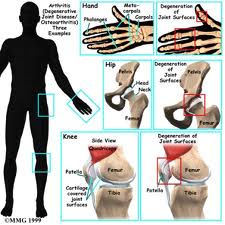
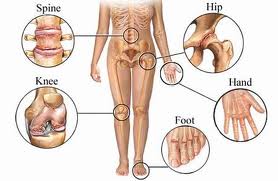
It is an inflammation caused by crystallized toxic waste from a diet of constipating foods and/or synthetic chemicals that reduce moisture in the joints and cause waste deposits in the joints. The presence of arthritis can mean that the body is not dissolving and flushing out toxins or minerals. The waste deposits can collect and congest in the tissues and muscles. The body immobilizes (stops) any part of the body that needs repairs. For example, a sprained wrist becomes stiff and a strained muscle becomes stiff (called nature's cast). An injured part of the body remains sore or stiff until it is repaired. If repairs are not made then that part becomes permanently stiff (calcified) or immobilized. The crystallized waste in impaired or immobilized joints and/or tissue can rub against each other causing inflammation. Arthritis is inflammation caused by waste in the bone joints while rheumatism is waste in the muscles. The body uses heat (inflammation) to increase circulation, kill bacteria and bring healing nutrients to arthritic areas. Conventional drugs ultimately make arthritis worse and destroy the body!
One In Every 250 Black Women Have Lupus
What is lupus? How does it feel? Many people with lupus feel tired, experience joint aches and pains, loss of hair, scarring skin lesions, while others may develop complications with involvement of the kidneys or central nervous system. The symptoms can be persistent or intermittent, and the devastating reality is that many women don't even know they have the disease. Lupus, an autoimmune disease in which antibodies react against the body's own tissue, affects nearly 250,000 Americans. The arthritis-related disease is a chronic and sometimes life threatening disease that occurs in one of three forms: discoid lupus, which affects the skin; drug- induced lupus, which occurs because of a reaction to one or more drugs and usually disappears when the person stops taking the drug; and systemic lupus erythematosus (or SLE), which involves the skin, joints, kidneys, nervous system, lungs, heart and/or other organs.
According to the Arthritis Foundation, 90 percent of lupus patients are women and a large majority of those women are African-American. However, the disease overwhelmingly affects women and most commonly affects them in their childbearing years ages 15 to 45.
"What we do know is that a large number of women aren't aware they're living with the disease."
"Two hundred and fifty thousand people have been diagnosed with lupus, and early detection and treatment of the disease is the first step toward coping with the disease," said Dr. Klippel. The Arthritis Foundation wants women, especially African-American women, to be aware of the common signs of lupus and to visit their physician if they experience four or more of the usual lupus symptoms.
Older Africans experience greater challenges with osteoarthritis than other cultures. In a review published in Ethnicity & Disease (Vol. 14, 2004), Tamara Baker, an assistant professor at the University of South Florida's School of Aging Studies and her colleague, Kelli Dominick (Duke University), found that older African-Americans have especially high rates of osteoarthritis (OA), suffer more from arthritis-related pain and physical limitations than older whites, and are more likely than their white counterparts to be under-treated for arthritis pain and disability.
The Impact of Arthritis on Black people
In their review, Baker and Dominick found that:
Women experience a higher prevalence of knee OA (osteoarthritis) than men.
African men are more likely to be diagnosed with hip OA than white men.
Africans were more likely than whites to report some activity limitation.
Africans more often ranked arthritis as the primary cause of physical limitation.
Nearly 6.3 million of the 70 million people with arthritis or a related condition are African Americans.
Arthritis is one of the most common conditions reported among Africans -- more common than heart disease, chronic bronchitis, asthma and diabetes.
After age 35, African-American women report a higher rate of arthritis than Caucasian women.
Africans with arthritis say it is the top condition that limits their major daily activities.
Economic factors and availability of transportation also may contribute to differences in seeking care for arthritis.
T.A. Baker, Center for Research on Ethnicity, Culture, and Health, School of Public Health, University of Michigan, Ann Arbor, Michigan 48104-3028, USA. tamarab@umich.edu
Africans with a mean age of 70.1+/-9.01 years. Experience pain in the knee(s) (77%) was the most frequently reported pain location. Joint pain (95%) was the most frequently reported arthritis symptom. The multivariate analysis showed that reporting more depressive symptoms and experiencing limited joint movement were significant indicators of pain intensity and accounted for 31% of its variation. The results of this study reinforce the importance of examining the relationship between pain, psychosocial factors, and demographic characteristics among older African Americans. Washington University in St. Louis school of medicine. Arthritis and resulting disabilities appear worse in African-Americans.
Hypertension, High Blood Pressure and Stress
High blood pressure and hypertension are usually caused by a lack of proper nutrition. Improper nutrition weakens the internal organs, immune system, and lowers the organs’ abilities to utilize nutrients, which feed the body. The body begins to starve because of the loss of proper nutrients. This starvation causes a nutritional deficiency. The nutritionally starved body tries to get more nutrients to pay the debt. Consequently, the body demands more food (nutrients in the blood) by drawing on poor (below-nutrient-level) blood. In order to increase the nutrients the body needs, it must get nutrients from the blood, and so it increases the quantity of blood by increasing the pressure. The increase of pressure is the body’s attempt to feed itself. This increase in pressure is the body’s last resort to defend itself against the bodily pollutions, gland disorders, free radicals, kidney weakness, hypertension, being overweight, emotional stress, toxemia, deteriorating metabolism, etc., and a foodless food (junk food) diet.
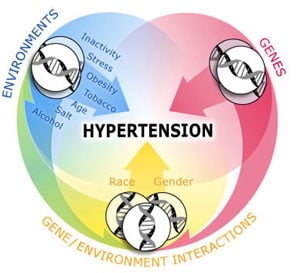
An inflexible vascular system is unable to bring pressure down. The pressure gets high and cannot come down to normal. However, the increased blood pressure fails to nourish the body, because the junk foods (fiber-less enzyme depleted) are depleted of nutrients. This results in hypertension and stress. The blood nutrients can only be supplied by a natural whole foods diet. Additionally, the blood can have an accumulation of waste floating in it. The waste gets into the veins and arteries causing them to lose flexibility. The more cellular and chemical waste there is in the blood, the less oxygen and nutrients. The pressure is elevated in order to get more nutrients delivered to starved tissue, but instead brings more waste and less air. This rise in blood pressure demands more nutrients to sustain the high blood pressure in the blood - which is thick with waste - stresses the heart and causes a nutritional unpaid debt. This is the case of nutritional suicide as high blood pressure causes high pressure, which is turn causes, an extreme nutrient loss called low blood pressure. Subsequently, high and low pressure caused by disease. The high blood pressure diminishes the ability of the kidneys to filter waste, regulate hormones, aide mineral absorption and cell formation. The kidneys require the temperature and pressure to be normal in order for them to function.
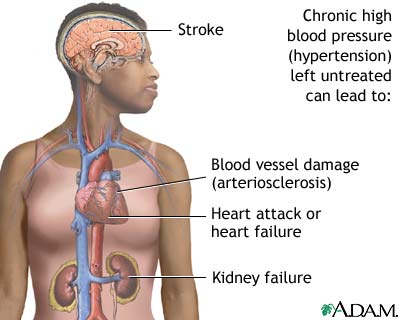
The stress reaction does not cause diseases such as heart disease, arterial hypertension, and nervous disorder. Stress reaction triggers the release of adrenaline. However, wild animals have larger adrenal glands that tamed (domesticated) animals. Consequently, wild animals produce more adrenaline and are under more stress. They do not have disease associated with uncooked foods and processed junk foods.
It is the junk food diet and immunosuppressive drugs and malnourishment that cause stress. If stress were the cause of diseases rather than nutrient poor diet then Black chattel slaves would have died from stress and high blood pressure.
It is the nutrient poor health — caused by immunosuppressive drugs (antibiotics, etc.), fiber-less food, cooked food and free radicals (waste) — that causes the disease reaction of hypertension, stress, etc.
80% of all Africans over the age of 45 have high blood pressure "The silent killer."
High Blood Pressure is a major killer of Africans in particular. Stress, poor diet, alcohol and drugs are some of the major causes.
Risk factors for high blood pressure include smoking, alcohol abuse, obesity, a high salt intake, lack of exercise and stress - and a family history of hypertension and stroke.
Arteriosclerosis, or a thickening, hardening and narrowing of the walls of the arteries is also often associated with high blood pressure.
Drug Therapy like many synthetic drugs, and anti-hypertensive medication has a risk of causing side effects depending on the person as well as the type of drug being taken. These can include, dizziness, nausea, stomach problems, fatigue, impotence, insomnia, loss of appetite and others. Always speak to your doctor if you are experiencing any of these symptoms.
What about natural remedies?
There are many well-known natural remedies for high blood pressure or hypertension. Conventional medicines usually treat the symptoms of high blood pressure, but seldom address the underlying causes.
Naturopaths recognize that high blood pressure may be a sign or symptom of imbalance in the body. They believe in removing the causes of high blood pressure with a combination of lifestyle changes and natural remedies, rather than simply treating the symptoms.
Can herbal remedies and dietary supplements really help?
There is a great deal of scientific evidence to suggest that the use of carefully chosen herbal remedies and dietary supplements can help to lower blood pressure, as well as to improve the overall functioning of the heart, arteries and the entire cardiovascular system.
What herbalists have known for centuries has now been clinically proven to be a potentiallyeffective alternative to synthetic blood pressure medication, especially if combined with a healthy diet and regular exercise.
Why being black increases your risk of high blood pressure
High blood pressure is more common and more severe in black people. But you can still take steps to protect yourself and treat the disease effectively with lifestyle changes and medications. If you're black, pay special attention to your blood pressure — even if you think you're healthy. That's because high blood pressure (hypertension) affects certain groups of people differently than others. And for black people in the United States, high blood pressure often occurs earlier in life, is more severe and has more complications. If you're black and living in the United States, you're more likely than a person of another culture to develop hypertension and to develop it earlier in your life. And once you have the disease, you're more likely to have severe complications, such as stroke, kidney failure and heart disease. In addition, blacks often don't get treatment until their blood pressure has been high for so long that vital organs nearly distroyed. Find out why you may be at greater risk of high blood pressure if you're black and what steps you can take to protect yourself.
More info on blood pressure...
You can take steps to reduce your risk of high blood pressure (see below). They will also help lower blood pressure if it is already high, and reduce your risk of having a stroke.
Stop smoking
Smoking doubles your risk of a stroke because it causes the arteries to become 'furry' and makes the blood more likely to develop clots.
Drink sensibly
Drinking too much alcohol raises blood pressure. If you keep your intake within the healthy guidelines, the occasional drink will not increase blood pressure or stroke risk. Recommended limits are two to three units a day for women and three to four units a day for men. Use the alcohol unit calculator to find out how much you're drinking.
Healthy diet
“Everyone can lower their blood pressure by including lots of fruit and vegetables in their diet,” says Graham. Aim for five portions of fruit and vegetables (fresh, tinned, dried, frozen or juice) every day.
You can cut down on salt (which is a major cause of high blood pressure) by checking the labels of processed foods and not adding salt to your food.
Try to cut down on foods that have been marinated or preserved in salt. “We recommend using fresh herbs and spices instead of very salt-rich seasonings,” says Graham.
You can lower your intake of saturated fat (which hardens the arteries) by avoiding or eating less red meat. Eat fish and poultry, such as chicken, without the skin instead.
For more information on healthy eating for African Caribbean people, see the Blood Pressure Association’s website.
Get active
Regular exercise (at least 30 minutes, five times a week) helps lower blood pressure and reduces the risk of stroke. You don’t have to go to the gym. You can do any activity that leaves you feeling slightly out of breath. This could be walking, dancing or gardening, for example.
If you're not used to exercising, take it slowly at first. If you have high blood pressure or have had a stroke, talk to your doctor about the right level of exercise for you.
Prostate problems
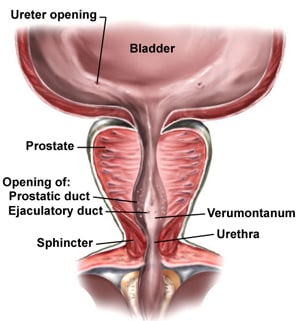
The prostate is partly muscle and gland. It is about he size of a walnut with a donut shape. It is directly underneath the bladder and surrounds the tube (urethra) that allows urine to flow out of the bladder and pass out through the penis. The prostrate secretes a thin cloudy alkaline fluid that helps make up seminal fluid. The muscular contractions of the prostate squeeze the prostatic fluids and help mix it with semen and sperm. The muscles help to ejaculate. There are many types of prostate diseases and many factors that can cause prostate problems. Drugs (legal and illegal) harm it.
Prostatic Hypertrophy is enlargement of the prostate. It can slow down, interrupt, block, or stop the flow of urine as well as cause urine to stay in the bladder too long, resulting in infections and/or inflammation. This can lead to kidney disease and destroy the kidney.
Prostatitis is the inflammation of the prostate. Disease can directly and indirectly affect the prostate such as Sugar Diabetes, High Blood Pressure, Rheumatism, Arthritis, Varicose Veins, as and Hypoglycemia, which damages prostate nerves.
There are early warnings of prostate problems. Premature baldness and/or ejaculation can indicate weakness and/or deterioration of the prostate. Young boys dribble urine after it stops flowing and often leave urine stains in their underwear. This may be indicating the beginning of prostate problems. Men that need to shake their penis several times because urine dribbles after urination stops may have the onset of problems. Usually, early warnings are ignored until the male reaches middle age and has an enlarged prostate, cancer of the prostate or infertility.
Infertility is rising, as twenty-five percent of married couples cannot have children. The sperm count was 120 million per millimeter in 1938 and dropped to 20 million per millimeter in 1991. It has been steadily decreasing each year. Imbalanced hormone levels (estrogen, progesterone and testosterone) can result in decreased sperm counts. Excess estrogen in non-organic foods lowers the progesterone and testosterone level, which lowers the sperm count and deteriorates the prostate.
There are estrogen and steroid-type chemicals in non-organic meats, milk (dairy), eggs, fruit, and vegetables. Excess estrogen weakens the prostate, causes cancer of the prostate and breast cancer in men. Synthetic estrogen in foods given to childbearing women can cause undescended testicles. Women eating non-organic commercial food with excess estrogen have more synthetic estrogen in their breast milk than is found in non-organic cow’s milk. Therefore, the consumption of excess estrogen in breast and cow’s milk starts the deterioration of the prostate.
Prostaglandin hormones, as well as Adrenalin hormones are released as a reaction to High Blood Pressure, Stress, Diabetes, Obesity, Drugs, Junk Food, Non-Organic Meat, Egg, and Dairy consumption. Prostaglandins cause prostate muscle contraction and are anti-inflammatory. They can be high in semen. An overly high prostaglandin level weakens the tissue of the prostate, the prostate reacts by getting thicker, developing scar tissue and becomes hypertrophied (enlarged).
The prostate is harmed by white sugar, alcohol, vinegar, salt, processed foods, the toxic synthetic chemicals in commercial deodorants, colognes, cough suppressants and allergy remedies. They enter the blood and prostate. They cause cellular waste to be suppressed (kept) in the prostate and alter normal function. It is best to use natural products purchased from health food stores. Sexual intercourse with ejaculation causes the same nutrients’ energy loss as running 20 miles. A lifestyle with junk foods and excessive sex without nutritional supplementation and prostate herbs will eventually destroy the prostate.
About Diabetes
Diabetes is disease of the pancreas. The melanin centers of the pancreas (Islet of Langerhaus) are harmed or damaged. The condition exists when the body has sugar (natural fuel for the body) available, but fails to recognize it. This causes excess sugar to accumulate, which the body gets rid of by excess urination. The urine will become morbid and change in odor and color. Excessive urinating causes thirst, dehydration, weight loss, loss of appetite, and an overworked kidney and pancreas. The pancreas secretes the hormone insulin, which stimulates the use of sugar. Diseases, emotions and /or social stressors can over stimulate the pituitary and/or adrenals, which overtaxes the pancreas, resulting in diabetes. People can have misdiagnosed or sub clinical diabetes-related diseases of high blood pressure, hyperactivity, kidney failure, cataracts, nerve damage, glaucoma, infertility, mood swings, hair loss, bone loss, etc. Diabetes is usually caused by overeating and refined carbohydrates (bleached white flour, white rice, white grits, cooked white potatoes, and refined white sugar). Eating excessive amounts of animal flesh and cooked animal fats (fats and proteins change to sugar in the body) can cause diabetes.
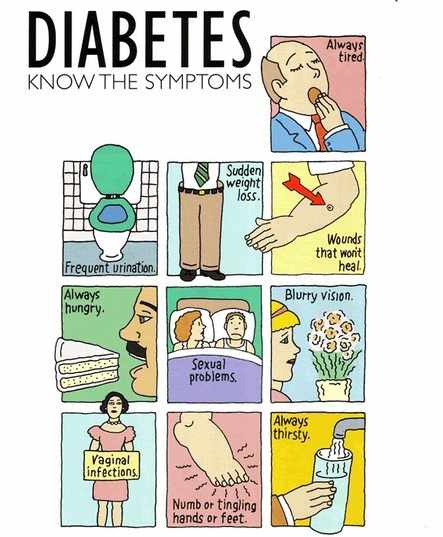
Epidemic Among Africans
Approximately eleven percent of all Africans have diabetes.
Diabetes is the fifth leading cause of death in African Americans.
Africans have more amputations from diabetes than all other cultures. Africans with diabetes experience kidney failure about four times more often than diabetic white Americans.
In 2005, diabetes has been the leading cause of blindness among African Americans.
The death rate for Africans with diabetes is 40% higher than other cultures.
3.2 million Africans age 20 years and older (or 13.3 percent) have diabetes, one-third of whom are undiagnosed.
On average, Africans are 1.8 times more likely to have diabetes as non-Hispanic whites of similar age.
In general, Africans are more likely to develop complications, have more disability, and are more likely to die as a result of diabetes than whites.
Diabetes results in death for 20 percent more African men and 40 percent more African women than whites.
Diabetic retinopathy is 40 percent to 50 percent more common in Africans than in white Americans. This may also be related to higher rates of high blood pressure in African Americans.
Africans with diabetes experience kidney failure – also called end-stage renal disease (ESRD) –about four times more often than diabetic white Americans.
Among diabetic African Americans, 9.3 per 1,000 were hospitalized for amputation (removal) of body parts (i.e. toes, feet) in 1994, compared with 5.8 per 1,000 white diabetic patients. Diabetic neuropathy is the diabetes complication that can damage nerve tissue and lead to a need for amputation.
National Diabetes Education Program
“Diabetes is ravaging our community. We must spread the word about the many ways we can beat this devastating disease,” said Risco.
Dr. James R. Gavin, III, Chair of NDEP and President of Morehouse School of Medicine.
"Every minute of every day, another American develops Type 2 diabetes,” said Dr. Gavin at the news conference announcing the outreach effort. “Nearly three million Africans have been diagnosed with diabetes and millions more are likely to develop the disease in the coming years, unless we get serious about prevention today."
What is the link between cardiovascular disease and diabetes?
Cardiovascular disease is the leading cause of death for people with diabetes, accounting for about 65 percent of all deaths.
People with diabetes are 2 to 4 times more likely to have heart disease or suffer a stroke than people without diabetes.
People with Type 2 diabetes have the same high risk for heart attack as people without diabetes who already have had a heart attack.
About 73 percent of people with diabetes also have high blood pressure.
Smoking doubles the risk for heart disease in people with diabetes.
Diabetes is a self-managed disease. People with diabetes must take responsibility for their day-to-day care.
Cancer
When a cell loses 40% of its oxygen it is considered cancer!
You can defeat cancer with diet change, herbs and a return to whole foods.
The word Cancer means crab and/or creeping sore. Cancer tissue and cells cover a broad spectrum of malignant (bad) neoplasms (new cells). There are over one hundred types of bad new cells (malignant neoplasms) classified as cancer. Each is believed to have a different cause. The types of cancer are carcinomas; which affect glands, skin, organs, and mucous membrane skin; lymphomas, which affect lymph glands and fluid; sarcomas; which affect bones, muscles, connective tissue; and leukemia, which affects blood.
Cancer is a disease that has become a profit-making industry. As an industry, it must expand the medical signs and symptoms of cancers as well as the definition of cancer. This expands the market share (amount of people to buy treatments). This industry also expands its arsenal of treatments, such as drugs, research projects, chemotherapy, and surgeries which increase profit. Unfortunately, cancer is not a disease, but an industry.
Cancer develops when cells in a part of the body begin to grow out of control. Although there are many kinds of cancer, they all start because of out-of-control growth of abnormal cells.
Normal body cells grow, divide, and die in an orderly fashion. During the early years of a person's life, normal cells divide more rapidly until the person becomes an adult. After that, cells in most parts of the body divide only to replace worn-out or dying cells and to repair injuries.
Because cancer cells continue to grow and divide, they are different from normal cells. Instead of dying, they outlive normal cells and continue to form new abnormal cells.
Cancer cells often travel to other parts of the body where they begin to grow and replace normal tissue. The cancer cells get into the bloodstream or lymph vessels of our body. When cells from a cancer like breast cancer spread to another organ like the liver, the cancer is still called breast cancer, not liver cancer.
Cancer usually forms as a solid tumor. Some cancers, like leukemia, do not form tumors. Instead, these cancer cells involve the blood and blood-forming organs and circulate to other tissues where they grow.
Not all tumors are cancerous. Benign (non-cancerous) tumors do not spread to other parts of the body (metastasize) and, with very rare exceptions, are not life threatening.
Different types of cancer can behave very differently. For example, lung cancer and breast cancer are very different diseases. They grow at different rates and respond to different treatments. That is why people with cancer need treatment that is aimed at their particular kind of cancer.
Cancer is the second leading cause of death in the United States. Half of all men and one-third of all women in the US will develop cancer during their lifetimes. Today, millions of people are living with cancer or have had cancer. The risk of developing most types of cancer can be reduced by changes in a person's lifestyle, for example, by quitting smoking and eating a better diet. The sooner a cancer is found and treatment begins, the better are the chances for living for many years.
General Cancer Signs and Symptoms
It is important to know what some of the general (non-specific) signs and symptoms of cancer are. They include unexplained weight loss, fever, fatigue, pain, and changes in the skin. Of course, it’s important to remember that having any of these does not necessarily mean that cancer is present--there are many other conditions that can cause these signs and symptoms as well.
Unexplained weight loss:
Most people with cancer will lose weight at some time with their disease. An unexplained (unintentional) weight loss of about 10 pounds may be the first sign of cancer, particularly cancers of the pancreas, stomach, esophagus, or lung.
Fever:
Fever is very common with cancer, but is more often seen in advanced disease. Almost all patients with cancer will have fever at some time, particularly if the cancer or its treatment affects the immune system and reduces resistance to infection. Less often, fever may be an early sign of cancer, such as with Hodgkin's disease.
Fatigue:
Fatigue may be a significant symptom as the cancer progresses. It may occur early, however, especially if the cancer is causing a chronic loss of blood, as in some colon or stomach cancers.
Pain:
Pain may be an early sign with some cancers, such as bone cancers or testicular cancer. Most often, however, pain is a symptom of advanced disease.
Skin changes:
In addition to cancers of the skin, some internal cancers can produce visible skin signs such as darkening (hyper-pigmentation) yellowing (jaundice), reddening (erythema), itching, or excessive hair growth.
In African Americans, about 130,800 new cancer cases are expected to be diagnosed in 2005. Further, cancer is the second leading cause of death, surpassed only by heart disease. In general, Africans with cancer have shorter survival than Whites at all stages of diagnosis.
Statistical Cancer Facts for African (Ethinc/Black)
Among African children, ages 1-14 years, cancer ranks third among the leading causes of death surpassed only by accidents and homicides.
Breast Cancer
Breast cancer is the second leading cause of cancer death among African women, exceeded only by lung cancer.
In 2001, approximately 19,300 new cases are expected among African women while 5,800 are expected to die from breast cancer.
Despite the stabilization of rates, cancer mortality among African women is still approximately 28% higher than White women.
Colon and rectum cancer is the third leading cause of cancer death among both African men and women. An estimated 6,800 Africans are expected to die from these types of cancers in 2009.
Colon & Rectum Cancer
Those of African /Ethnicityhave the highest death rate from colon and rectum cancer of any racial or ethnic group in the US.
Death rates for cancer of the colon and rectum among Africans are about 30% higher than among Whites and more than two times higher than for Asian Americans, Pacific Islanders, American Indians, and Hispanics.
For both African men and women, cancer of the colon and rectum and cancer of the pancreas rank third and fourth as leading causes of cancer death.
Colon and rectum cancer are the third most common cancer incidence among African Americans, both men and women. In 2001, 14,100 Africans (6,500 men and 7,600 women) are expected to be diagnosed with the disease. When colon and rectum cancer among Africans is detected at a localized stage, the survival rate is 84%; however, only 33% of cancers are detected at a localized stage. According to data for patients diagnosed during 1989-1996, the 5-year relative survival rate from colon and rectum cancer among Africans was 52%, compared to 62% among Whites.
Lung Cancer
Lung cancer is the leading cause of cancer death in African Americans, and is expected to cause 9,800 deaths in men and 6,300 deaths in women in 2001.
Cancer of the lung is the second most common cancer in Africans with about 10,600 African men and 7,600 African women expected to be diagnosed with it in 2001.
African men have significantly higher lung cancer incidence rates than other racial and ethnic populations.
Prostate cancer is the second leading cause of cancer death among African men with approximately 6,100 African men expected to die from it in 2001.
Prostate Cancer
In 2001, the most commonly diagnosed cancer in African men is expected to be prostate cancer (37%), followed by cancers of the lung (15%), and of the colon and rectum (9%).
African men have far higher death rates from prostate cancer than any other racial or ethnic group.
Approximately 25,300 newly diagnosed cases of prostate cancer are expected to occur in 2001, accounting for 37% of all cancers diagnosed among African men.
Although prostate cancer incidence rates are high in Whites, the rate for Africans is 60% higher.
Both incidence and mortality rates from lung cancer are higher among African men than in Whites, even though they begin smoking at an older age and smoke fewer cigarettes per day.
During the period 1960-1962, 42% of African women were overweight, compared with 22% of African men. By 1998, 64% of African women were overweight and 32% were characterized as obese.
For all cancer sites combined, cancer death rates among Africans are higher than other racial or ethnic populations in the US.
African women who are diagnosed with breast cancer are less likely than White women to survive five years after diagnosis. The rate among African women is 71%, compared to 86% among Whites.
In 1997, African high school students were somewhat less likely to eat fruits and vegetables and more likely to eat high-fat foods compared to White students.
National data suggests that the prevalence of smoking among African youth is on the rise. According to the CDC Youth Risk Behavior Survey (YRBSS), cigarette smoking increased in 1999 among African high school students approximately 34% among males and 23% among females.
Nearly 31% (30.7 %) of Africans have incomes below the poverty level.
More Pain
Minorities with cancer often suffer more pain due to under-medication. Nearly 62% of patients at institutions serving predominately African patients were not prescribed adequate analgesics.
In 1995, 5.7 million Africans were smokers in the United States. In 1997, 32.1% of African men and 22.4% of women reported that they were current smokers. This prevalence of smoking is considerably higher than the Healthy People 2010 goal of 12%.
Data from the 1998 Behavioral Risk Factor Surveillance System (BRFSS) shows that more than one-third of African adults (33.8%) reported no leisure-time physical activity with African women more likely than men to be physically inactive (39.9% versus 25.9% respectively).
Twenty-eight percent of Africans reported having a proctoscopic examination within the past five years. Although the rate of colorectal screening tests has improved, the percentage of Africans being screened still remains low.
Skin Lightening .... Non-prescription creams that claim to bleach or lighten your skin can be harmful.
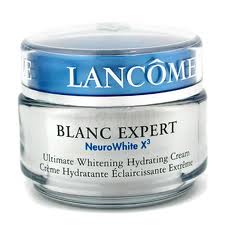
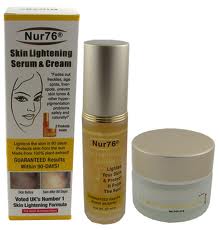
'Patients are often very distressed by the results of skin-lightening creams' Indy Rihal, British Skin Foundation
A survey carried out by the British Skin Foundation found that 16% of dermatologists believe lightening creams are ‘completely unsafe’ and 80% feel they are only safe when prescribed by a dermatologist.
“Unfortunately, many skin-lightening creams contain illegal compounds that can damage your health,” says Indy Rihal of the British Skin Foundation. “The most common compounds are high-dose steroids.”
Some creams also contain hydroquinone, a bleaching agent that is banned from use in cosmetics.
The damaging effects of these products are taken seriously by the law. In 2007, a couple in London who had sold non-prescription skin-lightening creams were fined £70,000.
In March 2009, a man who sold unlicensed medicines and banned cosmetics, including skin-lightening creams containing corticosteroids and hydroquinone, was ordered to pay £80,000 in fines, costs and repayment of illegal earnings.
Lightening risks
Although steroids can be useful in treating some skin diseases, such as psoriasis and eczema, this must take place under the supervision of a skin specialist.
“Unmonitored use of high-dose steroids can lead to many problems,” says Rihal. “Patients are often very distressed by the results of skin-lightening creams.”
Skin lightening creams can cause:
- permanent skin bleaching
- thinning of skin
- uneven colour loss, leading to a blotchy appearance
- redness and
- intense irritation
If you've used a skin lightening cream and are worried about the effect it has had, see a GP. They may be able to refer you to a dermatologist.
A cream that you buy over the counter is not necessarily medically approved and could permanently damage your skin.
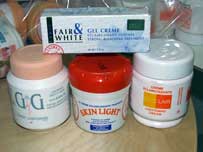
© 2020 Majority NOT Minority Ltd - All rights reserved.
No republication of this material, in any form or medium, is permitted without express permission of the author